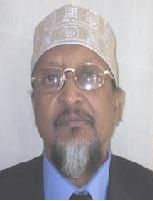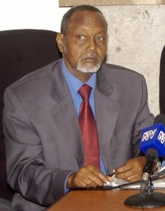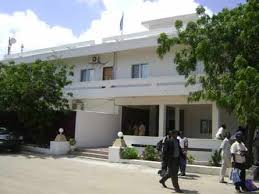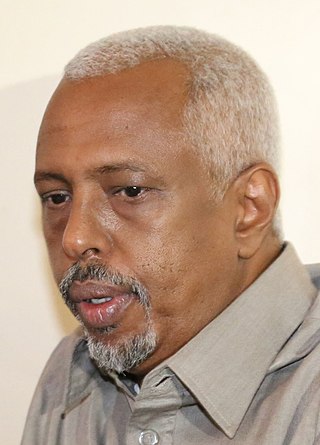| |||||
| Decades: | |||||
|---|---|---|---|---|---|
| See also: | |||||
The following lists events that happened during 2005 in Somalia .
| |||||
| Decades: | |||||
|---|---|---|---|---|---|
| See also: | |||||
The following lists events that happened during 2005 in Somalia .

Hassan Abshir Farah was a Somali politician. He previously served as mayor of Mogadishu and interior minister of Puntland. From November 12, 2001 to November 8, 2003, he was also prime minister of Somalia. Farah was an MP in the Federal Parliament of Somalia.

Abdullahi Yusuf Ahmed was a Somali politician and former military officer. He was one of the founders of the rebel Somali Salvation Democratic Front (SSDF), as well as the Puntland state of Somalia, the latter of which he served as the first president. In 2004, Yusuf also helped establish the Transitional Federal Government (TFG), which he led as President of Somalia from 2004 until 2008.

Jowhar is the capital city of Hirshabelle state of Somalia. Jowhar is also the administrative capital of Middle Shabelle region of Somalia.

Ali Mohammed Gedi, popularly known as Ali Gedi, is a Somali politician who was the Prime Minister of the Transitional Federal Government (TFG) of Somalia from 2004 to 2007. He was relatively unknown in political circles upon his appointment as prime minister in November 2004. He is affiliated with the Abgaal subclan of Mogadishu's Hawiye clan, one of Somalia's four most powerful clan 'families'. He narrowly survived a suicide attack at his home that left at least seven people dead on June 3, 2007. Gedi was widely viewed as corrupt, and was replaced by Nur Hassan Hussein as PM during late 2007.

The Transitional Federal Government (TFG) was internationally recognized as a provisional government of the Somalia from 14 October 2004 until 20 August 2012, when its tenure officially ended and the Federal Government of Somalia (FGS) was inaugurated.

The Ethiopian invasion of Somalia, also known as the Ethiopian occupation of Somalia or the Ethiopian intervention in the Somali Civil War, was an armed conflict that lasted from late 2006 to early 2009. It began when military forces from Ethiopia, supported by the United States, invaded Somalia to depose the Islamic Courts Union (ICU) and install the Transitional Federal Government (TFG). The conflict continued after the invasion when an anti-Ethiopian insurgency emerged and rapidly escalated. During 2007 and 2008, the insurgency recaptured the majority of territory lost by the ICU.

The 2006 Islamic Courts Union offensive is the period in the Somali Civil War that began in May 2006 with the Islamic Courts Union's (ICU) conquest of Mogadishu from the Alliance for the Restoration of Peace and Counter-Terrorism (ARPCT) and continued with further ICU expansion in the country. Following the outbreak of the war on December 21, 2006; by December 24, direct Ethiopian intervention in the conflict in support of the Transitional Federal Government (TFG) was no longer denied by the Ethiopian government. The Eritrean government denied any involvement despite Ethiopian claims to the contrary.
Following the civil war and the ensuing societal chaos, some factions managed to exert a degree of authority over certain regions of Somalia where they maintained broad, clan-based support. This allowed these factions to establish working administrations and eventually coherent states, and restored order to their regions. This occurred first in Puntland, Southwestern Somalia, Galmudug, Jubaland and finally Banadir.
Mohamed Qanyare Afrah (Somali: Maxamed Qanyare Afrax, Arabic: محمد افراح قنياري} was a Somali faction leader and politician who was based south of Mogadishu in the Daynile District. He came in third position in Somalia's first election as a federal country on 10 October 2004 and was subsequently appointed minister of public security in the government of Prime Minister Ali Mohammed Ghedi, He served as minister of security in 2006 but was dismissed after ignoring calls by the Prime Minister Ali Mohammed Ghedi to stop fighting forces of the Islamist Courts. He continued to participate actively in Somali political affairs being reelected to the first post transitional federal parliament of Somalia as a member of parliament, he resigned from his seat representing his clan in the summer of 2013, his seat in the Federal Parliament of Somalia was taken over by his son Cabdiweli Mohamed Qanyare.

The transitional federal government (TFG) was the government of Somalia between 2004 and 2012. Established 2004 in Djibouti through various international conferences, it was an attempt to restore national institutions to the country after the 1991 collapse of the Siad Barre government and the ensuing Somali Civil War.

Colonel Hasan Muhammad Nur Shatigadud (1946-2013) was a Somali politician and faction leader. He served as the chairman of the Rahanweyn Resistance Army (RRA), and subsequently as the first President of the short-lived Southwestern Somalia autonomous regional state. Shatigadud was later a Member of the Transitional Federal Parliament, and was eventually appointed Minister of Finance in the Transitional Federal Government. Shatigadud was succeeded as president by Madobe Nunow.
After two decades of violence and civil war and after the Transitional Federal Government (TFG) of Somalia captured Mogadishu and Kismayo, the TFG attempted to disarm the militias of the country in late 2006. According to the UN/World Bank's Joint Needs Assessment (JNA) coordination secretariat, "the total estimated number of militias [militia members] to be demobilized is 53,000." In 2005, they estimated that "there are 11–15,000 militia people controlling Mogadishu ."

Villa Somalia in Mogadishu, is the palace and principal workplace of the president of Somalia. The current occupant of Villa Somalia is President Hassan Sheikh Mohamud (HSM) of the Federal Government of Somalia (FGS).
The timeline of events in the War in Somalia during 2006 is set out below.

The timeline of events in the War in Somalia during 2007 is set out below.

Aden Mohamed Nuur Madobe, popularly known as Aden Madobe, is a Somali politician who is the current Speaker of the Lower House of the Federal Parliament of Somalia since April 2022. He previously served as the First Deputy Chairman of the Rahanweyn Resistance Army, before later joining the newly formed Transitional Federal Government (TFG) of Somalia as Minister of Justice and Speaker of the Transitional Federal Parliament. From 29 December 2008 to 31 January 2009, Madobe briefly served as acting president of Somalia. In January 2014, he was appointed Minister of Industry and Commerce.

Nur Hassan Hussein, popularly known as Nur Adde, was a Somali politician, who served as Prime Minister of Somalia from November 2007 to February 2009. He was from Mogadishu and part of the Abgaal sub-clan of the Hawiye.

Indirect presidential elections were held in Somalia on 30 January 2009. Due to the security situation in Baidoa, it was held in Djibouti. President Sharif Sheikh Ahmed won the election.
The following lists events that happened during 2004 in Somalia.

Ali Abdullahi Osoble he was born in Mogadishu, Somalia) on June 15 1961 he’s is the son of Abdullahi Osoble Siad, who was Minister of Telecommunications during the Siad Barre Regime in the 1970s and 1980s and also the maternal grandson of Ahmed Gelle, who was the Minister of Justice prior to the military regime. He was first president of Hirshabelle State, the regional federal state of Somalia and the first to serve under its established name of Hirshabelle. Osoble is the individual who presided over the creation of state institutions of Hirshabelle.